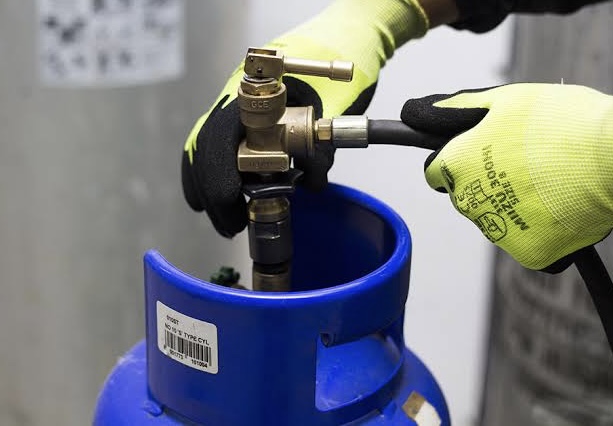KEY POINTS
- LPG prices in Abuja remain stable at ₦1,200–₦1,500 per kg despite sharp increases in Lagos.
- Supply disruptions linked to last week’s PENGASSAN strike and refinery issues drove temporary nationwide volatility.
- NNPC boss Bayo Ojulari calls the recent price hike “artificial,” assuring the market will stabilise soon.
Cooking gas prices in Nigeria’s capital city have held steady even as consumers in Lagos and other regions battle rising costs following last week’s supply disruptions.
A market survey across the Federal Capital Territory (FCT) on Monday showed that Liquefied Petroleum Gas (LPG) — popularly known as cooking gas — is selling between ₦1,200 and ₦1,500 per kilogram, depending on the area. Vendors in Gwarimpa and Dutse said prices have remained largely unchanged in recent days, offering some relief to households already stretched by inflation and rising energy costs.
Uche Chinedu, a vendor in Gwarimpa, said his outlet sells LPG at ₦1,200 per kilogram — equivalent to about ₦15,000 for a 12.5kg cylinder. “At filling stations, the price goes for about ₦1,090 per litre,” he said. In nearby communities such as Dawaki, Kubwa, and Lugbe, prices ranged between ₦1,200 and ₦1,500 per kilogram, with few signs of further upward movement.
Lagos Faces Price Spike Amid Supply Disruptions
The situation in Abuja contrasts sharply with that in Lagos, where retail prices have surged to between ₦1,700 and ₦2,000 per kilogram — the highest levels recorded so far this month. Dealers blame last week’s feud between the Petroleum and Natural Gas Senior Staff Association of Nigeria (PENGASSAN) and the Dangote Petroleum Refinery for disrupting supply chains.
The dispute reportedly affected product distribution from the refinery, currently the largest domestic producer of LPG in the country, leading to temporary shortages across parts of the Southwest.
Bayo Ojulari, Group Chief Executive Officer of the Nigerian National Petroleum Company Limited (NNPCL), said on Monday that the price surge was “artificial,” driven largely by speculative trading and supply hoarding. “We have sufficient product in the system,” Ojulari said, assuring that prices are expected to normalise once distribution flows return to pre-disruption levels.
Analysts note that Nigeria’s fragmented LPG distribution network remains vulnerable to supply shocks and labor disputes, particularly as domestic demand rises. The stability in Abuja, they say, could be temporary unless structural issues — such as transportation bottlenecks and uneven regional access — are addressed.
The Nigerian government has in recent months intensified efforts to boost domestic gas utilisation and reduce reliance on imported LPG. The Dangote Refinery and Nigeria LNG Limited (NLNG) are expected to play central roles in that push, with both producers pledging to prioritise local markets.
For now, Abuja’s price stability offers a brief respite for residents, even as consumers nationwide brace for continued volatility in the cooking gas market.



